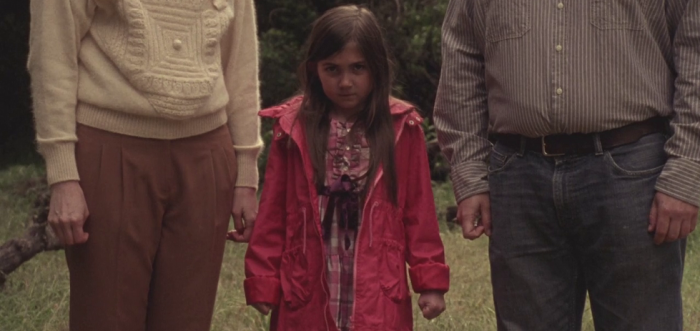We Like Shorts, Shorts is a new column in which we single out impressive short films which are easily accessible online. The full shorts will always be embedded in the articles for easy access.
Before his first foray into feature-film direction Faults, which we reviewed at last year’s Possible Worlds festival, Riley Stearns worked on a number of short films, often collaborating with Faults star Mary Elizabeth Winstead, the most well-known of which is probably The Cub. Co-executive produced by Winstead and written and directed by Stearns, The Cub feels like a collaboration between Napoleon Dynamite writer/director Jared Hess and Wes Anderson – it’s a bizarre and delightful short that sees two parents (played by Davey Johnson and Mandy Olsen) hire a pack of wolves to raise their daughter (played by Alexis McGraw and Savannah Lathem) for a period of exactly 10 years, offering future compensation. The short then jumps 10 years into the future, their daughter now a teenager, the wolves having successfully completed their side of the bargain. From here Stearns sets us up for an entertaining and gnarly final gag.
The short was kickstarted in late 2012, successfully raising just over $5000 which allowed Stearns to shoot the film on 16mm film – it’s a nice aesthetic touch that softens the feature and makes it feel almost like an old-school home movie, fitting in pleasantly with the themes of family and heritage explored in the film. While the idea behind it is simple (what if a child was literally raised by wolves), by limiting its scope – we don’t ever see the wolves, the runtime is a little shy of 5 minutes, the framing is extremely basic, etc. – Stearns delivers a punchy short with a particularly high chuckle-to-beats ratio.
The Cub has more to offer than a few laughs; there is a thinly veiled, on-point (albeit fairly basic) message to offer us about people who have ‘parenting methods’ and the schooling system that operates in most of the Western world, and the performances (although limited in scope but durational constraints) are more than competent. This is a nice little example of the humour that Stearns can bring out of the mundane, with basic expositional lines twisted to provide laughs – something we saw more of in his following directorial effort Faults. It’s clear why this short was accepted into Sundance’s 2013 program (in addition to spots on the line-ups of numerous other festivals) and helped generate a bit of hype around his first feature effort, the humour (although arguably derivative) hits the target, the direction has a particular unique style to it (it was clear to me that this was a Stearns production having seen some of his other work), and the central conceit is solid. The soundtrack (although obviously limited by the sub-5 minute runtime) is impeccable and Stearns achieves a surprising amount given its limited scope and minimalist direction.
